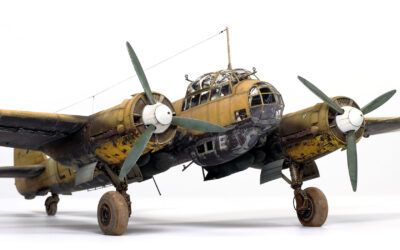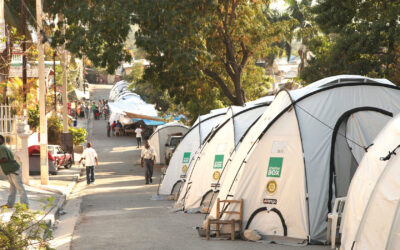Garreth Murrell is a member of the Tyneside Rotary Club with a decade-long military career, including tours of Northern Ireland and Bosnia. Having overcome his Post Traumatic Stress Disorder thanks to Neuro Linguistic Psychotherapy, Garreth changed careers to become a psychotherapist as well as founding the charity ‘Veterans at Ease’. To date, Garreth has helped over 400 veterans, serving personnel and their families deal with PTSD and find peace of mind.
Listen to this article
A year ago, after 45 days 1 hour, and 54 minutes at sea, Garreth Murrell completed the Talisker Whisky Atlantic Challenge as part of Team Emotive, made up of three members of his military mental health charity Veterans at Ease – Chris Harvey, Jason Watkin, and Phil Kite. It is regarded as the world’s toughest row – a 3,000-mile feat of endurance from San Sebastian in La Gomera in the Canary Islands, to Nelson’s Dockyard English Harbour on the Carribean island of Antigua & Barbuda. In completing the epic challenge, Garreth became the first Rotarian to cross the Atlantic Ocean in a rowing boat.
After three and a half years of training and fund-raising in order for the challenge to take place, all that lay in front of Garreth was nearly two months of battling the elements in one of the world’s most foreboding oceans. How did he get on? Garreth takes you through the journey in his own words.
Race Day – December 12th, 2022
Walking down to the marina is quite surreal, knowing that once we depart there is no going back, as literally after one mile out at sea, the currents and tides are so strong you cannot physically row back.
A few other rowers are also stirring and, like Chris and myself, are silently walking down to the marina one last time in quiet contemplation of what must be done and what is yet to come.
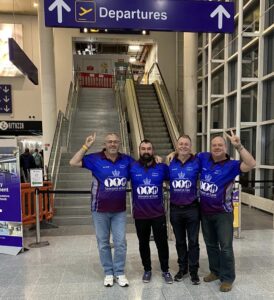

Team Emotive – Jason Watkin, Chris Harvey, Phil Kite and Garreth Murrell – at Newcastle Airport.
As the clock ticks ever onwards to 12:00 – our departure time – I’m sat in the boat in my seat connected by a harness and elasticated leash, looking up at my wife. Despite the couple of thousand people present I can only see my darling wife.
I gesture to her using hand signals that I love her as tears begin to roll down my cheeks. They are tears of happiness, knowing that all I have to do now to see her again is row to Antigua until someone says stop rowing.
We row out slowly to much applause and pageantry then before we know it, we are two miles out and that’s it, no going back – the game is on!
The First Week
It’s said in briefings that the worst time is the first seven days. I found this to be most certainly true.
There is so much going on that your body and mind are desperately trying not to get overwhelmed.
You have to eat, sleep, and go the loo all in the space of three single beds whilst sharing this space with three other men who are not slight in stature.
There’s the sun to keep away from, the motion of the boat and, of course, getting used to each other – how we are in the early hours as well as how we are before and after a two-hour shift on the oars. The blisters were dealt with by wrapping them with zinc oxide tape – after a few days, the skin under the tape hardened quite nicely.
Stormy Weather
The following seven days from Boxing Day were, by far, the most taxing and testing for us – the weather started to get worse, and quickly.
There is a need for a great deal of self-care in conditions like these and personal admin in dealing with soaking clothes and swollen hands due to the constant wetness. Eating and drinking enough food and fluids becomes laborious and even talking is something that, if you are not careful, drifts away.
So, when the boat gets struck by rogue waves that come out of nowhere at night, your mettle is very severely tested.
The waves at this time were at their highest at around 25 to 30 feet. Of course, the benefit of rowing hard to get to the top before they break is that you get that massive surge forward as you literally surf down the other side.
Watching the speed counter became exhilarating when you hit a new speed record and disappointing when you thought you’d got a good wave and didn’t go as fast as you’d hoped.
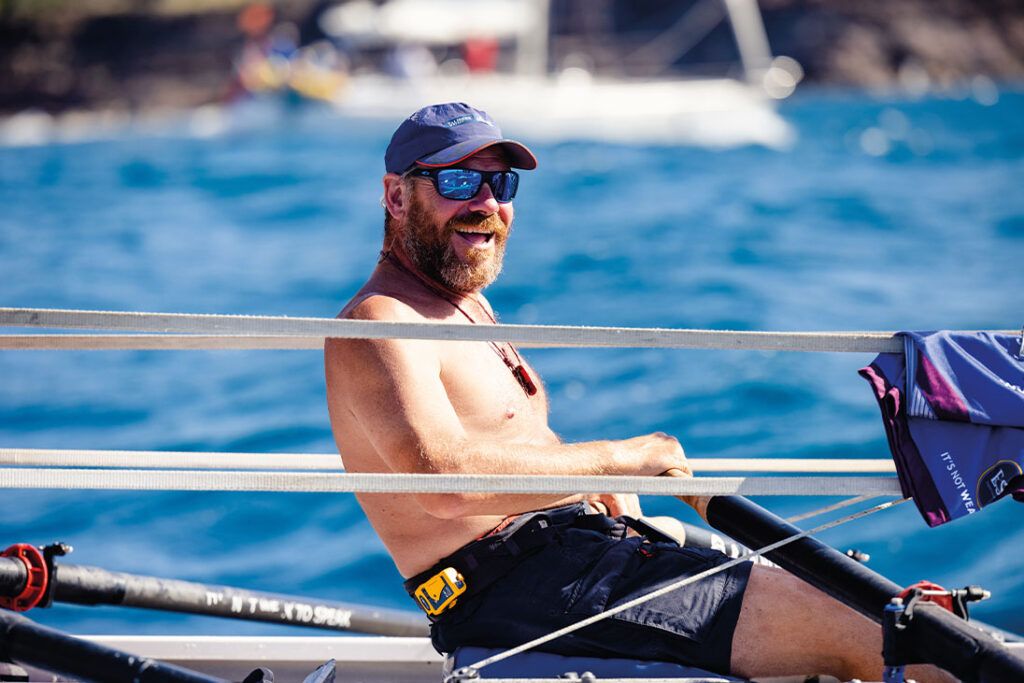

Garreth Murrell is a member of Tyneside Rotary Club and founder of the charity Veterans At Ease. Photo by Atlantic Campaigns. © Penny Bird.
Raising Morale
Now the rains had stopped, and the sun had returned, this gave us time to dry our things out and once again get back to normal (normal for us anyway).
I decided that I had spent far too long eating cold food so made it my purpose to boil water every day and rehydrate everyone’s meals that they’d chosen. The first hot meal I had tasted was wonderful. It was like I’d only tasted food for the first time and every spoonful was a pure taste sensation.
That simple task of heating water to make hot food had a large influence on the morale of the crew. We began making good decisions about the course with quicker changeovers, well, Jason and I did; Phil was hilariously late and lots of laughter would happen as he took over from his manservant Chris. We didn’t call him five-star Phil for nothing!
A Rude Awakening – Phil’s Story
Around week 4 Phil and I were happily rowing in sync together and chatting where possible when Phil noticed a small green light off to our rear port side. I’ll hand over the story to Phil now…
“On my second night shift at 2am, I suddenly saw a boat’s green light really close and told Garreth who clocked that he could see it too. After only two oar strokes we could see both its navigation lights which meant it was bearing down on us, and fast!
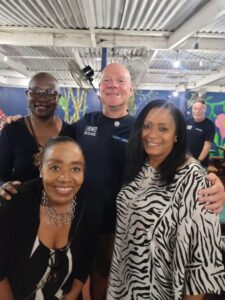

Garreth with the President of Antigua Rotary.
“We had no power due to low light levels for the previous few days which meant our batteries hadn’t fully charged up, so no AIS or navigation lights were on to tell the other boat of our presence.
“Whilst the boat was bearing down on us Chris was now awake; he used his headlamp to assemble the radio. Once Garreth got the torch the radio arrived but appeared to me not to be working.
“I gave it Garreth, and I used the high-power torch to point directly at the boat – after a few long, and I mean really long, seconds the boat shone its light on us and at the same time responded to Garreth’s calm yet urgent message that they were now aware of us.
“It then sped, and I mean sped, across our stern from right to left less than 100 feet away. The captain just said we wish you luck and they were gone.”
On reflection, if we had done nothing there was a very high likelihood of a significant and catastrophic incident.
Approaching Antigua
We have been in touch with our loved ones ensuring they have everything we need when we arrive.
Two days to go and things are feeling like they are coming to a veritable whirlwind of a conclusion.
We see Antigua for the first time at night. The bright lights are a fiery giveaway.
We can now also see the lights of other Caribbean islands and I keep checking the chart plotter to make sure we are still heading for the right island.
It makes me wonder what the mariners did long ago when approaching a new island at night.
January 26th, 2023 – Challenge Completed
As the day breaks, we are in clear sight of Antigua and can see individual houses as we are now only eight miles or so away.
Our skipper is in touch with the race safety team who is telling us to row closer to the shore and then row parallel to it.
Around 11 am, the first other human beings we have seen since the race yacht incident arrive in the form of two Antiguan Coastguards.
They circle us for a few minutes, probably ensuring that we are OK. Then, just before they speed off, they shout “Welcome to Antigua”. Wow! For some reason that was a really emotional moment for me.
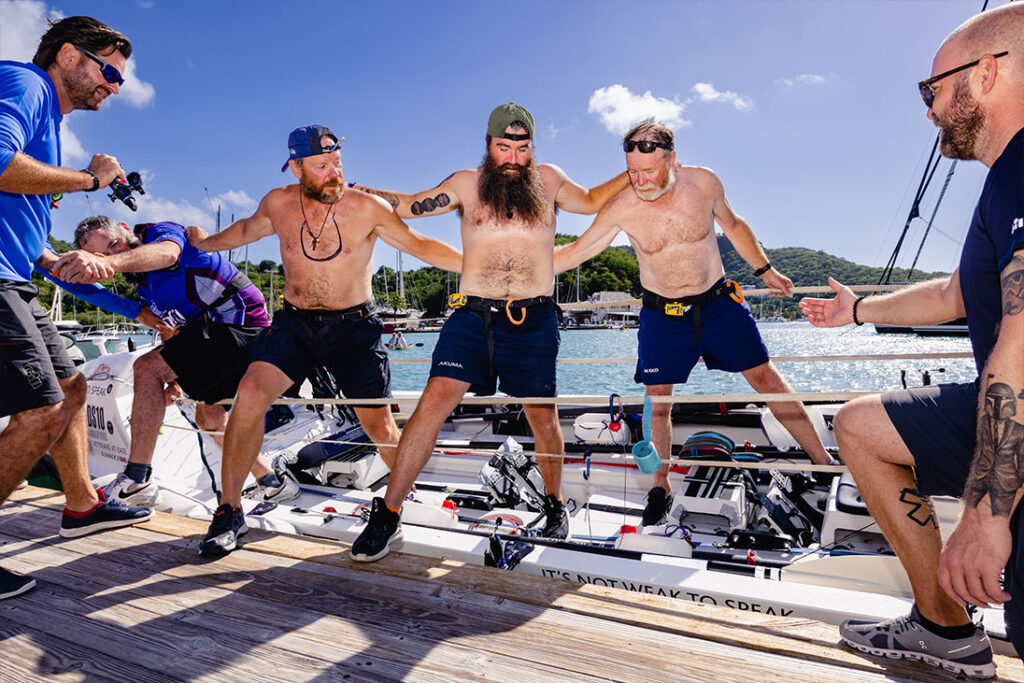

Team Emotive taking their first steps on dry land after 45 days of rowing. © Penny Bird.
Finally, we cross in between the two buoys, and Ian Crouch from the race safety team lights a flare from where he is at the small fort on a small peninsula that juts out into the bay. We can now stop rowing. We have done it!
Emotions well up like a volcano erupting. I lean back and congratulate Chris who has leaned forward to do the same. I lean forward and give our skipper a hug; he was steering us in manually from around three miles out. Then we let the oars go and get out of our foot straps.
We are being led in and directed by Atlantic Campaign staff and make landfall with a gentle bump. Waiting for us are around 80 cheering, clapping and flag-waving souls.
We can finally go forward to hug our expectant loved ones who have flown out to meet and greet us when we land – as you can imagine there are lots of tears.
One last thing, we get led over to a gazebo where waiting for us is a lovely plate of burgers and chips and a nice ice-cold beer… heaven!
Would I do it again? Well, you’ll just have to book me in for a talk to find out!
You can get in touch with Garreth via email – garreth@veteransatease.org










